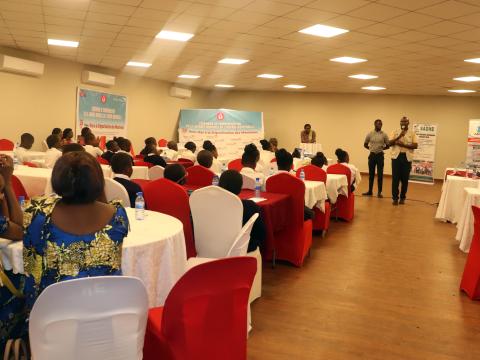DR Congo: Commitments made by the authorities to mark Menstrual Hygiene Day

By Tatiana Ballay, Communications Officer
World Vision, in partnership with the provincial government of Haut-Katanga, commemorated Menstrual Hygiene Day. The commemorative ceremony for this 2023 edition took place in Lubumbashi. Organised by World Vision with the support of partner community associations, It was an opportunity to launch a collective appeal for the mobilisation of all, in order to promote the hygienic management of menstruation in schools in particular and in Congolese society in general.
The aim of Menstrual Hygiene Day is to recognise the right of women everywhere to manage their periods hygienically, and to encourage people to discuss the challenges facing women.
To mark the occasion, World Vision, through its WASH programme, lobbied the provincial government and civil society as a whole to say "No to the stigmatisation of menstruation", an action that ties in with this year's international theme for 2023: "Make menstruation a normal part of life by 2030".
The aim is to enable children to know their bodies and the associated manifestations from adolescence through to puberty, open up a conversation on the subject, provide key information on the actions to be taken, and reduce health risks. "Menstrual hygiene also deserves our full attention because of its specific nature and should attract everyone's attention. We couldn't imagine what this could cause in the deepest part of every human being. As representatives of the people, we understand everything. And we're going to support you so that together we can find a solution for our society. There really is an urgent need for sanitary cubicles that meet standards in our schools and churches", said Thomas Lupata, Speaker of the Haut-Katanga provincial assembly.
That's why, during the ceremony and on behalf of the provincial assembly, he sent a message to the partners and the whole community. "Our constitution makes public health an obligation and requires the state to do everything possible to ensure that the population is protected. We also believe that many women and girls experience this difficulty on a daily basis. We're going to be involved, we'll be everywhere we can, as long as the conditions of our mothers and young girls can be improved", he added.
Some girls also drop out of school completely when they menstruate. There are several reasons for this, including the lack of appropriate latrines, information and hygiene products in schools.
During this activity, the acceptance of women conditions in Congolese society was raised by a 10-year-old girl called Bénédicte with a poem entitled "Je Proteste" ("I Protest").
"We, the young girls from civil society organisations in Haut-Katanga, are the voice of vulnerable women and girls who have no mouths. We thought it essential to present to you our deepest concerns, which are in line with the remit of the ministry you are responsible for. But also to propose a few possible solutions, the implementation of which will contribute to a significant improvement in the management of menstrual hygiene, the key to our future", said Benedicte.
Menstruation is still a taboo subject in many countries, including the DR Congo. So, to get things moving, this issue needs to be seen as everyone's business, not just that of women, and the priority is still communication.
For World Vision representative Samuel Djesse, this day is about calling on decision-makers to improve menstrual hygiene management conditions. "We support the efforts of our partners in the manufacture and promotion of washable sanitary tapes. We are building sanitary facilities in schools, health centres and churches. These sanitary facilities meet international norms and standards. We also build water wells in our communities... We believe that with everyone. We're going to clean up the environment and provide the comfort that women and girls need during menstruation.”
Since 2018 in the city of Lubumbashi, the World Vision WASH programme has been supporting communities by building standard latrines and boreholes in schools. More than 100 latrines have been built in schools in the Lubumbashi cluster. Members of community associations and teachers have been trained in menstrual management and they are ready to communicate, inform and educate about menstrual hygiene management.
Girls' low level of knowledge about menstruation remains a major problem for menstrual hygiene management. 58% of girls and 59% of boys at school at the time of the survey said they had heard of menstruation. Almost 53.2% of girls have an average level of knowledge about menstruation of 2 out of 7 points. What's more, menstruation is a subject that is rarely discussed, either in the family or at school, because of the strong taboo associated with it. The consequences of girls' lack of knowledge about menstruation are seen in their attitudes and practices relating to menstrual hygiene. 42.4% of girls behave differently during menstruation, and 10.4% of girls who said they had missed school in the month preceding the survey cited menstruation as one of the reasons. Menstruation therefore remains one of the reasons why girls are absent from school. In the case of girls who had started menstruating at school in the month prior to the survey, 73.75% of them left the school immediately, indicating that menstrual hygiene is difficult to manage in the school environment ( « Source : Étude sur la Gestion de l’Hygiène Menstruelle Haut-Katanga RDC 2018 » ménée par Catholic Relief Service et Unicef )